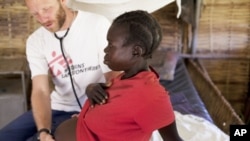A new study suggests that at least one surgical procedure, Caesarean delivery, is a highly effective way of improving health at a reasonable cost in developing countries.
Researchers weighed the value of making caesarean deliveries more accessible to pregnant women.
An estimated 270,000 women die each year from complications during their pregnancy. One of the most common is obstructed labor, where the fetus cannot move down the birth canal. When that happens, mother and baby may both die. Even if the mother survives, she is at risk of developing an obstetric fistula, which leads to incontinence and, often, divorce and social isolation.
"So it's a real problem and easily fixable. As long as the mother gets to a district hospital or a referral center that's able to perform caesarean deliveries, this can be prevented," said Harvard Medical School researcher Blake Alkire.
He notes that deaths from obstructed labor are virtually unknown in wealthier countries. Women there almost always have the option of a caesarean birth, in which the baby is delivered through a surgical incision in the mother’s uterus.
To measure the real value of caesarean surgery, Alkire used data from the World Health Organization, starting with the estimated economic benefit from preventing death and injury.
"And then we essentially just compared that to the cost of caesarean deliveries, to arrive at a benefit-cost ratio of six to one," he said.
So, $6 in benefit for every $1 spent. The cost of the Caesarean birth was actually remarkably low - an average of about $140.
If anything, the six-fold benefit may actually understate the value of caesarean, or c-section, births, since Alkire's calculations only include the value of saving the mother's life, not the child's.
Many children who go through obstructed delivery don't make it. "Anywhere from 30 to 60 percent, or greater, of the fetuses unfortunately die. With a c-section, with timely access to c-section, [the death rate] approaches zero."
News
Study: C-Sections Needed in Developing World
- By Art Chimes

Can be cost-effective way to improve health



